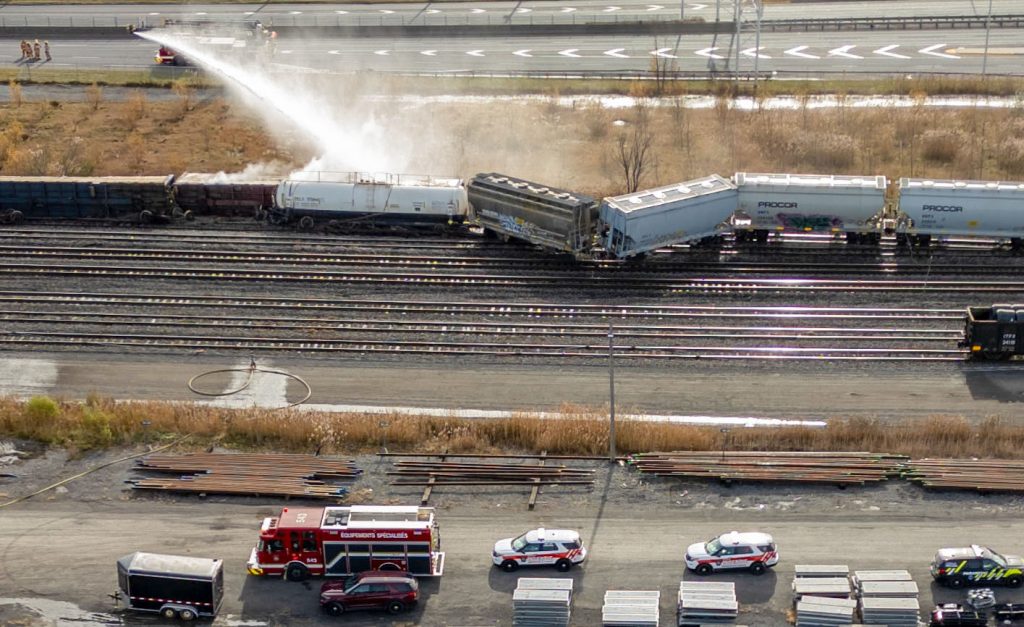Flash freeze warning: Montreal launching salt, gravel-spreading operation to tackle icy streets

Posted February 28, 2024 9:00 am.
Last Updated February 28, 2024 6:29 pm.
Montreal is preparing to launch a salt- and gravel-spreading operation Wednesday evening after warm temperatures are expected to drop suddenly, leading to icy streets and sidewalks.
Another day of temperature-breaking records – with a high of 13 degrees Celsius – was expected to change significantly by nighttime, with temperatures dropping to minus-13 C overnight.
It’s a 26-degree swing in a matter of hours.
The “vigorous cold front” has led Environment Canada to issue a flash freeze warning for Quebec,
“Surfaces such as highways, roads, walkways and parking lots may become icy and slippery.
“Flash freeze warnings are issued when a rapid drop in temperature is expected, that can cause water from rain or melted snow on streets and sidewalks to quickly freeze.”
It means the City of Montreal is kicking off a major spreading operation around 10 p.m. that will last through the night – covering 6,000 kilometres of sidewalks and 4,000 kilometres of road.
“All in all, we have to cover a distance of 10,000 kilometres, and that’s 18 times back and forth Quebec-Montreal, so it’s a huge journey for our crew,” said Philippe Sabourin, spokesperson for the City of Montreal.

Sabourin is hoping to have the work done by 6 a.m. Thursday.
“That being said, be cautious tomorrow morning,” he said. “If it’s required, postpone your appointment. Take public transit. Keep in mind, we’re fighting against Mother Nature. And she’s damn good. She’s everywhere at the same time. She could change the temperature in a second.
“Our crews need time. We need hours to complete the operation. Usually, between eight and 12 hours, that’s the timelapse that we need to complete the spreading operation. So we’re asking everyone to be cautious, to understand that the city needs time to complete the operation.”
Winds up to 90km/h also in forecast
There’s also a wind warning in effect for Montreal Wednesday evening, with Environment Canada warning of “high westerly winds of up to 90 km per hour.”
“Loose objects may be tossed by the wind and cause injury or damage,” a separate weather alert from the authority reads. “High winds may result in power outages and fallen tree branches.”
That’s something Sabourin is aware of and preparing for.
“That could lead to power outages,” he acknowledged. “That could lead also to branches being broken, trees falling on the street. So our emergency crew will be on duty as well.
“So for what I know, at this point, we have 500 employees required for the spreading operation. And we will need hundreds of employees for the emergency situation if it’s ever happened. So we’re firing ourselves for the worst situation.”

Sabourin also addressed Montreal’s mild winter overall, and what that means for city expenses. There has only been one snow-removal operation since January 1, though there have been operations linked to freezing rain.
“At this point, there’s no way we can tell we’re saving money, because the budget starts on the 1st of January and ends at the end of December,” Sabourin explained. “So there’s 12 months to cover. We only did two months. We know for sure the month of March always brings surprises, and there’s also November and next December to cover.
“So we’re vigilant for the moment. We have nearly $200 million to cover the 12 months. At this point, we only had to go once with a snow removal, that’s a very expensive operation, but we only had to do it once. Usually, it’s five times a winter.”
–With files from Alyssia Rubertucci, CityNews








